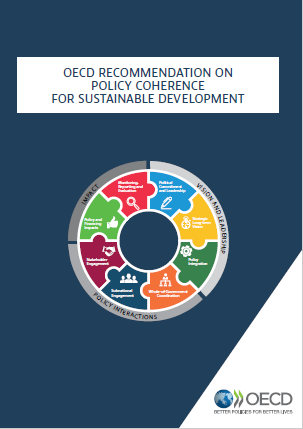Public governance
OECD Recommendation on Policy Coherence for Sustainable Development
A comprehensive standard to support policymakers in achieving the 2030 Agenda |
|||
|
Implementing the Sustainable Development Goals (SDGs) as an integrated and coherent set represents a major challenge to all countries. Addressing interactions between economic, social and environmental goals in a balanced manner, while avoiding negative effects on the wellbeing of people here and now, elsewhere and later, has been recognised by many countries as one of the most difficult challenges to implementing the SDGs. The OECD Recommendation on Policy Coherence for Sustainable Development (PCSD) is the culmination of more than 20 years of lessons learnt in promoting policy coherence. As a joint proposal from the Development Assistance Committee (DAC) and the Public Governance Committee (PGC), the Recommendation draws on the DAC peer reviews as well as on country experiences in the PGC. It responds to the growing demand by OECD Members and non-Members to deal with the “how” of coherent 2030 Agenda implementation. The Recommendation presents a set of eight principles for promoting PCSD, which are organised under three main pillars. It calls on Adherents to develop:
Download the Recommendation: |
|
||
|
The final adopted text of the Recommendation (11 December 2019) is available online Compendium of OECD Legal Instruments. |
|||
The 8 principles for promoting policy coherence |
||||||
| Vision and Leadership | Policy Interactions | Impact | ||||
|
1. Political Commitment and Leadership 2. Strategic Long-term Vision 3. Policy Integration; |
4. Whole-of-Government Coordination 5. Subnational Engagement 6. Stakeholder Engagement |
7. Policy and Financing Impacts 8. Monitoring, Reporting and Evaluation |
||||
Public consultation |
|
|
The Recommendation benefited from a broad public consultation, which generated a high level of input from government officials, civil society organizations, international organizations, interested citizens and stakeholders from all over the world. |
|
Related Documents
